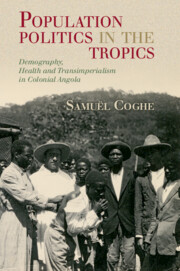Book contents
- Population Politics in the Tropics
- Global Health Histories
- Population Politics in the Tropics
- Copyright page
- Dedication
- Contents
- Maps
- Figures
- Tables
- Acknowledgements
- Note on the Spelling of Proper Names
- Introduction
- 1 Sleeping Sickness, Depopulation Anxieties and the Emergence of Population Politics
- 2 Tropical Medicine and Sleeping Sickness Control Before 1918
- 3 Introducing Social Medicine: Inter-Imperial Learning and the Assistência Médica aos Indígenas in the Interwar Period
- 4 Re-assessing Population Decline: Medical Demography and the Tensions of Statistical Knowledge
- 5 Saving the Children: Infant Mortality and the Politics of Motherhood
- 6 The Problem of Migration: Depopulation Anxieties, Border Politics and the Tensions of Empire
- Conclusion
- Epilogue: Demography and Population Politics, 1945–75
- Bibliography
- Index
5 - Saving the Children: Infant Mortality and the Politics of Motherhood
Published online by Cambridge University Press: 20 January 2022
- Population Politics in the Tropics
- Global Health Histories
- Population Politics in the Tropics
- Copyright page
- Dedication
- Contents
- Maps
- Figures
- Tables
- Acknowledgements
- Note on the Spelling of Proper Names
- Introduction
- 1 Sleeping Sickness, Depopulation Anxieties and the Emergence of Population Politics
- 2 Tropical Medicine and Sleeping Sickness Control Before 1918
- 3 Introducing Social Medicine: Inter-Imperial Learning and the Assistência Médica aos Indígenas in the Interwar Period
- 4 Re-assessing Population Decline: Medical Demography and the Tensions of Statistical Knowledge
- 5 Saving the Children: Infant Mortality and the Politics of Motherhood
- 6 The Problem of Migration: Depopulation Anxieties, Border Politics and the Tensions of Empire
- Conclusion
- Epilogue: Demography and Population Politics, 1945–75
- Bibliography
- Index
Summary
In June 1931, approximately 200 delegates gathered in Geneva to attend the International Conference on the African Child. The first of its kind in Europe, the conference had been convened by the Save the Children International Union (SCIU), a philanthropic organisation with a strong Christian background. It brought together doctors, missionaries, social scientists and philanthropists, as well as high-ranking official representatives of colonial powers and international institutions like the League of Nations and the International Labour Office and even a few representatives of African associations. There were two Portuguese participants, one of whom was the Count of Penha Garcia, who also acted as vice-president of the conference and chaired one of the sessions. Being one of Portugal’s foremost colonial experts and diplomats of the time, his presence was testimony to the importance the Portuguese government attached to the event.1 For four days, the participants discussed issues considered key to the welfare of African children: the medical and socio-economic causes of and solutions to stillbirth and infant mortality, education, and working conditions for children and adolescents.2
- Type
- Chapter
- Information
- Population Politics in the TropicsDemography, Health and Transimperialism in Colonial Angola, pp. 178 - 205Publisher: Cambridge University PressPrint publication year: 2022

